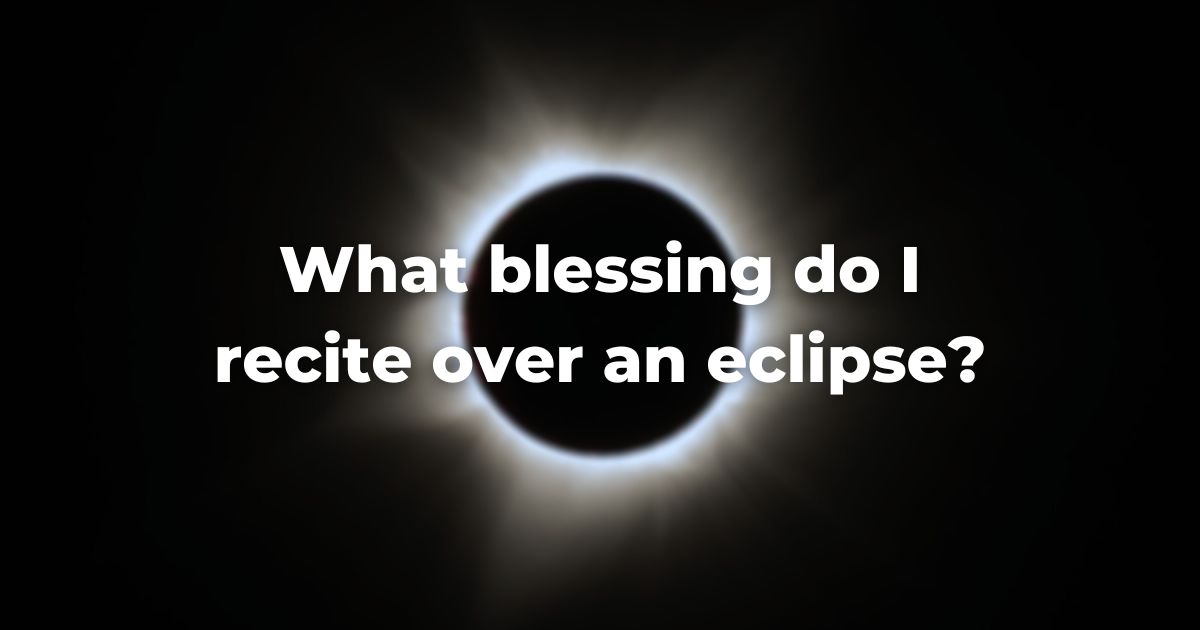Our tradition suggests that we see each life experience as an opportunity to connect to the Divine. While many texts can be invoked, the classic, most intensive liturgical response is through the form of a brakha, a blessing, invoking God’s name using the classic “Barukh Ata” phraseology.
Blessings, with this construction, are mandated for the consumption of food and the performance of many mitzvot.
The ninth chapter of tractate Berakhot, in the Mishnah and Talmud, enumerates the text of many blessings to be said specifically upon encountering remarkable natural or human phenomena. Examples include thunder and lightning, trees in new bloom, rainbows, extremely large crowds, or creatures of unusual appearance.
A solar eclipse, when our view of the sun is blocked by the moon, is certainly a unique natural event that causes us to ponder our place in the universe.
What blessing do I recite?
One who witnesses an eclipse should ideally recite the blessing:
בָּרוּךְ אַתָּה יְיָ אֱלֹהֵינוּ מֶלֶךְ הָעוֹלָם, שֶׁכֹּחוֹ וּגְבוּרָתוֹ מָלֵא עוֹלָם:
Barukh atah Adonai, eloheinu melekh ha-olam, she’kocho ug’vurato malei ‘olam.
Blessed are You, Adonai, our God, sovereign of time and space, whose power and strength fill the world.
The more general blessing that would also be acceptable.
בָּרוּךְ אַתָּה יְיָ אֱלֹהֵינוּ מֶלֶךְ הָעוֹלָם, עוֹשֶׂה מַעֲשֵׂה בְרֵאשִׁית:
Barukh atah Adonai, eloheinu melekh ha-olam, oseh ma’aseh v’reishit.
Blessed are You, Adonai, our God, sovereign of time and space, who performs the work of creation.
In addition, one may certainly add personal meditations or readings from our classic texts, like Psalm 121 or Psalm 148, or “El Adon” from the Shabbat Morning Shacharit.
An important safety note
Our tradition reminds us that we must stay away from anything that is a potential harm to life or limb. One should not look at a solar eclipse directly or even through regular sunglasses. A special eclipse-rated filter or pinhole apparatus should be used.
This blessing falls into the category of birkat hare’aya – blessings over that which is seen.
A blessing should be said when the eclipse becomes visible, as opposed to being obscured by clouds. The blessing applies if the eclipse is seen through a filter or pinhole projection, for that is how eclipses are normally witnessed. One would not say a blessing over a video of the event.
Read more
Read the full teshuvah, explanations, and related source sheets here.
This article is adapted and based on an unapproved CJLS teshuvah currently under review by the committee, “The Blessing to Be Said Upon Witnessing a Solar or Lunar Eclipse” by Rabbi Joshua Heller.
Author
-

Exploring Judaism is the digital home for Conservative/Masorti Judaism, embracing the beauty and complexity of Judaism, and our personal search for meaning, learning, and connecting. Our goal is to create content based on three core framing: Meaning-Making (Why?), Practical Living (How?), and Explainers (What?).



